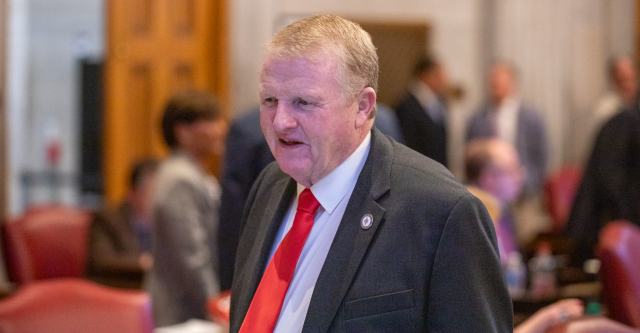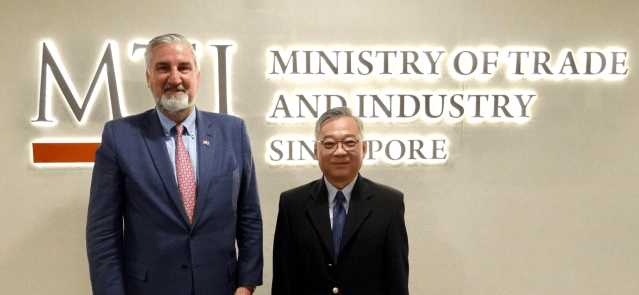Stay ahead of the curve as a political insider with deep policy analysis, daily briefings and policy-shaping tools.
Request a DemoKelly, Sinema Announce $11.3 Million Investment for Tucson’s City Bus Facilities from Bipartisan Infrastructure Law
Sinema & Kelly Announce $11.3 Million Investment for Tucson’s City Bus Facilities from Bipartisan Infrastructure Law
Gallego Joins Bipartisan, Bicameral Group of Colleagues in Condemning the Maduro Regime’s Sham Presidential Election
Court throws out Tennessee law cutting size of Metro Nashville Council
A state law seeking to cut the size of the Nashville Metro Council in half is unconstitutional, according to a 2-1 chancery court ruling issued on Monday.
The law was enacted amid a raft of efforts to punish the city’s elected officials for refusing to approve a framework to host this year’s Republican presidential convention. It runs afoul of the Tennessee Constitution’s “local legislation clause,” which requires a local approval to governance changes imposed by the General Assembly.
The opinion was issued by Chancellor Jerri Bryant of Athens and joined by Chancellor Patricia Head Moskal of Nashville. Circuit Judge Joseph Howell of Jackson in his dissent said he disagreed with the finding that the law was local in application, because it also applied to the state’s two other metropolitan governments, Hartsville-Trousdale County and Lynchburg-Moore County.
Howell was named to the case in March to succeed Shelby County Circuit Judge Mary Wagner after she was named to the state Supreme Court.
The ruling allowed for retaining the 20-member cap on any future metropolitan governments. It also found in the government’s favor over the plaintiffs’ claims that the state could not adjust a metropolitan charter after it was finalized.
Other laws blocked by three-judge panels sought to give state officials the authority to name most of the members of the Metro Nashville Airport Authority and change the number of votes required by the Metro Council to approve changes to the city’s racetrack.
The state attorney general’s office is appealing the airport decision but is not challenging the law related to trying to attract NASCAR racing to the Nashville Fairgrounds facility. A separate challenge over a law changing the makeup of the Nashville sports authority is on hold while the airport case works its way through the courts.
The court had previously blocked the law from being implemented in advance of last year’s elections because the changes would have come too soon before the vote.
Gubernatorial property tax plan debate heats up
Indiana gubernatorial nominees have presented dueling property tax proposals, causing the race’s focus to shift toward the practicality of their relief plans.
On Friday, U.S. Sen. Mike Braun, the Republican nominee for governor, unveiled his property tax plan. Braun called for Hoosiers whose homes are valued at more than $125,000 to receive a 60% homestead deduction. Under his plan, Hoosiers with homes valued below that amount would get a 60% supplemental deduction and a $48,000 standard deduction.
In addition, Braun would cap the increase in property tax bills for seniors, “low-income” Hoosiers and families with children under 18 at 2%; all other Hoosiers’ property tax bill increases would be capped at 3%.
Donald Rainwater, the Libertarian gubernatorial nominee, said in a Monday news release that his opponent’s property tax plan displays a “desire to continue the state government’s practice of giving some Hoosiers more favorable treatment than others.” Rainwater contended Braun’s plan fails to solve the “overall issue.”
Rainwater has proposed capping property taxes at 1% of a property’s purchase price for a maximum of seven years. He says his plan would end “perpetual” property taxes.
“Every Hoosier deserves to own their personal property without the fear of the government taking it for failure to pay taxes,” Rainwater said in the release.
Griffin Reid, the Indiana GOP’s communications director, responded in a separate Monday news release, arguing Rainwater’s plan would front-load Hoosiers’ property tax payments in the first seven years. Reid called Rainwater’s plan “unrealistic” and said it would “destroy the housing market.”
“Rainwater’s biggest issue with the Braun plan is that it prioritizes seniors and families, along with everyday Hoosiers,” Reid said in the release.
Democratic gubernatorial candidate Jennifer McCormick on Friday responded to Braun’s plan through a statement highlighting a vote he cast in 2015, as an Indiana House member, that carried an estimated impact of up to $38.6 million a year in additional taxes.
“Hoosiers are sick and tired of politicians who will say anything to get elected,” McCormick said in the statement. “Mike Braun voted for higher Hoosier property taxes when he had the chance and is now only talking about a tax cut because he’s another politician Hoosiers are sick of.”
McCormick’s campaign told State Affairs it will release a property tax plan in “the near future.”
During a Friday interview on WIBC-FM’s “Kendall and Casey” program, Braun defended his plan. He told the Indianapolis radio hosts he had spent time over the past month making sure his proposal is “doable” and said he would work to persuade legislators to support it.
Some observers question the practicality of Braun’s plan, including Indianapolis-based economist Morton Marcus, who told State Affairs that Braun’s proposal “demonstrates his lack of concern for Hoosiers.”
Cutting property taxes would shift resources away from schools, road repairs and other services, Marcus said, adding that increased revenues are needed “to compensate for the decades of decay from the 1970s onward.”
“Braun should be arguing for higher taxes on himself and others in his income bracket,” Marcus said. “He should be concerned about a ‘State That No Longer Works for Anybody’ and is now touted as a ‘State for the Bold’ who are willing to take the risk of living here.”
Economist Michael Hicks, a Ball State University professor, told State Affairs that Indiana’s economy is lagging the nation’s because not enough Hoosiers are going to college and too few Indiana cities and towns offer the “quality of life” needed to attract educated workers.
“Any tax proposal that reduces spending on education and quality of life will worsen Indiana’s economic prospects at a time [when] we are just beginning to experience the effects of a decade of declining educational attainment,” Hicks said.
Contact Jarred Meeks on X @jarredsmeeks or email him at [email protected].
Holcomb eyes more foreign travel, possible LEAP District deals
Gov. Eric Holcomb is wrapping up his 24th international economic development trip, which took him to Australia and Singapore over the past week.
Holcomb told reporters Sunday night from Singapore that he might take more foreign trips before his term ends in January.
Holcomb also said more business deals could be closed in the coming months for the LEAP Lebanon Innovation District even as it has become politically contentious in the gubernatorial campaign.
Some topics the governor discussed:
Continuing foreign travel
Holcomb has made economic development a top focus of his last year in office by touting the state’s READI 2.0 program and hosting an international investment summit in Indianapolis.
The governor is scheduled to return to Indiana Tuesday from his 11-day trip to Australia and Singapore. Combined with trips to Europe in June, Brazil and Mexico in April and Canada in January, Holcomb will have spent 32 days on official trips out of the country so far this year.
Holcomb said that “there is no substitute for showing up” and that he was “seizing on opportunities that are set before us.”
“It’s pedal to the metal. Indiana cannot afford to downshift down my stretch or in 169 days, I think it is, when I hand the keys to someone else to drive forward,” Holcomb said.
“I suspect there will be trips in the future because we’re bird-dogging that work right now,” he said. “Now, if we don’t go, we don’t go. They always haven’t panned out. But we want to make sure that we maximize our remaining days. … It would be lazy, at best, and derelict of duty if I did not follow up on helping our companies grow and fostering an environment that would help new friends join us on our Hoosier soil.”
LEAP District projects possibly on tap
Holcomb shows no signs of backing off the LEAP District project near Lebanon, saying economic momentum is continuing throughout the corridor between Lafayette and Indianapolis.
“LEAP continues to draw interest and I am optimistic that there will be much more good news to share before I do hand over the keys,” he said. “It will be an oasis, if you will, of opportunity for people to find great careers that contribute to not only our state’s growth but actually to our nation’s economic and national security, and those are the type of businesses that we’re looking to locate in the LEAP District.”
The Indiana Economic Development Corp., which is overseeing the LEAP District development, gained approval in June to spend $59 million on adding land to the district as three companies were considering projects there. The IEDC did not identify those companies.
How Holcomb judges success of foreign trips
The governor said building relationships in other countries is important, both for helping draw interest in Indiana investments and for boosting Indiana companies that do work overseas.
Holcomb’s current trip has included meeting with executives from the Australia or Singapore operations of Eli Lilly and Co., Elanco and Penske Corp.
He also met with numerous government and business leaders during stops in Sydney, Melbourne and Singapore.
“Hopefully, ultimately, we’re standing side by side in the state of Indiana and celebrating cutting a ribbon or doing a groundbreaking whenever they can get over to Indiana because they’ve decided to grow alongside us,” Holcomb said.
Major League Soccer in Indianapolis
Holcomb said he remained hopeful about the pursuit of a Major League Soccer expansion team in Indianapolis but is leaving that effort to Mayor Joe Hogsett and other local leaders.
“We hear in certain parts of the world, it’s global, but we hear it underscored fanatically the draw of soccer,” Holcomb said. “I just think with Indiana being such an international destination and has been for decades that soccer — football, as they would call it — would be another strong card for us to be able to play in terms of how sport and how the arts attract and pull people together and play into the livability of the community and the vibrancy of it. So I remain hopeful that those details can be worked out.”
Tom Davies is a Statehouse reporter for State Affairs Pro Indiana. Reach him at [email protected] or on X at @TomDaviesIND.
Charge of the tinfoil hat brigade? GOP primaries hit on a new theme
As ultra-right Republican candidates and allies mount aggressive primary assaults on rivals in Thursday’s primary election in Tennessee, two of the candidates now find themselves under attack by independent expenditure groups casting them as unstable backers of “tinfoil hat” conspiracies that make them unsuitable for public office.
Both involve more than an element of political revenge.
A political action armed with a $18,645 war chest is bombarding House District 65 mailboxes with a two-edged attack on right-wing conservative Michelle Foreman and Tennessee Stands founder Gary Humble.
The Tennesseans for Liberty PAC is funded largely by Tennessee Senate Republican Majority Leader Jack Johnson, Rep. Jake McCalmon and Susan Kaestner, wife of a former Williamson County commissioner.
Two years ago, Humble challenged Johnson, R-Franklin, in a contest which Johnson narrowly won.
The District 65 mailer features Foreman, an attorney who moved to Williamson County this cycle after losing a Nashville-based House race two years ago. Her face is pasted into a white van alongside Humble, who is featured wearing a tinfoil hat, a longtime visual symbol of a term used to deride conspiracy theorists.

It assails both Foreman and Humble, who is backing Foreman. A political vendor he controls has been hired to work on her bid.
“Michelle Foreman’s campaign advisor, Gary Humble, is a conspiracy theorist who believes the 9/11 attacks on America was an inside job committed by Republicans,” the mailer reads. “Michelle Foreman’s campaign adviser, Gary Humble, says Trump supporters are members of a cult. Michelle Foreman’s campaign is endorsed by the radical “Anti-Trump” Tennessee Stands Groups.”
Another slam: “Michelle Foreman has defended neo-nazi Brad Lewis on social media from criticism over his Nazi & white supremacist activities, saying they have a personal relationship.” The mailer also charges Foreman “is also friends with disgraced Franklin mayoral candidate Gabby Hanson, who was supported by Lewis & Nazi groups. Hanson lost her election the same way she has lost her two previous elections.”
While living in Davidson County two years ago, Foreman lost a House District 59 race to Democrat Caleb Hemmer.
The Franklin-centered district contest also includes Williamson County Commissioner Brian Bethard, seen as more of a moderate in the mold of departing representative Sam Whitson.
Also in the hunt is real estate investor and attorney Lee Reeves who has the blessings of Gov. Bill Lee, a fellow Williamson County Republican. The governor this cycle has embarked on a mission to elect candidates in open seats who will support his quest to pass a statewide school voucher bill. Foreman opposes vouchers as does Humble. The money side of the equation is being filled by a PAC funded by the Club for Growth.
Johnson gave $5,000 to Tennesseans for Liberty PAC through his Jack-PAC while McCalmon contributed $5,000. Kaestner, who heads the PAC, donated another $3,000.
A tinfoil trend?
The tinfoil attack has caught on in at least one other GOP primary, that being the House District 27 GOP primary in Hamilton County where a website is attacking “Constitutional Conservative” and Realtor Michele Reneau who is mounting a serious challenge to House Finance Chair Patsy Hazlewood of Signal Mountain. That’s left top House Republican leaders nervous but some local Republicans have jumped in to help Hazlewood. U.S. Sen. Marsha Blackburn, probably the state’s best-known conservative figure, has endorsed Hazlewood.
Among other things, a mystery website, nomichelereneau.com has now popped up.
“Vote No On tinfoil Reneau,” the site says, displaying a photo of a smiling Reneau with a tinfoil cap. “Too Dangerous for Tennessee.”

The site accuses the challenger of being a “leader of a bizarre national group who pushes dangerous treatments” that include “curing dangerous infections like strep” and “even claiming COVID-19 was “caused by cell towers, not a virus, and could be cured by wearing a tinfoil hat. Seriously.”
The group cites Reneau’s role as the head of the Chattanooga chapter of the Weston A. Price Foundation, a group that has warned of the purported dangers of soy.
Another paste-up photo on the anti-Reneau site depicts the candidate beside a horse, both bedecked in tinfoil hats.
In announcing her campaign, Reneau stated she was running as a “Conservative Republican.” Hazlewood, she said “often votes with Democrats to oppose Conservative legislation pertaining to illegal immigration, medical freedom, freedom of speech, Christian values, and transparency in government.” Reneau aso cited the Tennessee Conservative giving Hazlewood its “RINO of the Year Award.”
The site has hammered Hazlewood for months. Publisher Brandon Lewis in June said on the site he was sponsoring a fundraiser for Reneau at his home.
Reneau is one of several self-described “constitutional conservatives” running this year who have dusted off the tea party playbook to target GOP incumbents. Reneau and other hard-right conservatives invoke the term “RINO,” (Republican in Name Only,” to attack Republicans they deem less than pure. The term is a favorite of Brandon Lewis, a Hamilton County Republican and former Hamilton County Election commissioner who founded the Tennessee Conservative website that often slams traditional or moderate Republicans as “RINOs.”
Lewis also hawks a $297 prospective video training manual complete with workbook to candidates which advises them on messaging, fundraising, get-out-the-vote manuals, canvassing, digital data and voter data “acquisition management” to defeat incumbents.
Lewis has come a considerable way since he publicly apologized and resigned his election commission seat in 2010 following his arrest and guilty plea to public drunkenness charges after he was found “asleep on the sidewalk straddling a stop sign, almost sticking in the roadway,” according to a police report.
He later unsuccessfully sought an appointment as Hamilton County’s Administrator of Elections.
Wake Up Call for Monday, July 29, 2024
Legislative candidate urges fellow Dems not to cross over into Republican congressional primary
Tyler Brasher, a candidate to succeed retiring Rep. Darren Jernigan in Nashville’s District 60, has sent out a mailer with an unusual appeal to fellow Democrats. “Don’t vote in the Republican primary to beat Andy Ogles,” it says. “A vote for Courtney Johnston is a vote for Donald Trump.”
Johnston, a Nashville Metro Council member, has been touting her conservative credentials in challenging the controversial freshman congressman. But some Ogles opponents are also hoping for a large number of Democratic crossover voters to cast ballots in the Republican race to help tip the balance. Anyone who votes in the GOP primary won’t be able to participate in down-ticket Democratic contests such as Brasher versus Shaundelle Brooks.

Brooks, whose son was killed in a mass shooting at a Nashville Waffle House in 2018, has been a frequent gun protester at the Statehouse. She has been endorsed by Reps. Justin Jones of Nashville and Gloria Johnson of Knoxville. Brasher, a financial consultant, is president of the Donelson Hermitage Neighborhood Alliance. His backers include Rep. Bo Mitchell of Nashville and Michelle Morse Jernigan, the incumbent’s wife. A third candidate, John Parrish, has yet to file a financial disclosure.
Editor’s note: A version of this story appeared in the print edition of The Tennessee Journal on July 26. Read the full newsletter here.
The Brasher mailer includes an image of the Ogles family posing for a Christmas card with rifles and calls the Republican “beatable” in November. The winner of the GOP nomination will face Maryam Abolfazli, who has raised $174,800 through the most recent disclosure period. Ogles has brought in $691,100, while Johnston has led the way with $784,800 in donations.
Floodgates bolted?
While Ogles benefited greatly from heavy spending by outside groups in his 2022 election, the outpouring has been less generous this time around. Americans for Prosperity — Ogles’ former employer — has spent $212,500 so far, though only $93,200 of that has come in June and July. The House Freedom Caucus PAC spent another $57,700 either backing Ogles or opposing Johnston. Meanwhile, the anti-Ogles Conservatives With Character PAC has boosted its spending to $383,800, nearly two-thirds of which has come as early voting was getting underway.
The relative dearth of independent expenditures on Ogles’ behalf — the Club for Growth has been notable for remaining largely on the sidelines this time around — has led to varying interpretations. Ogles’ backers see it as a sign that the incumbent doesn’t face a serious threat from Johnston despite her strong fundraising numbers. Opponents view it as a sign that Ogles’ scandals and antics — he filed articles of impeachment this week against the Democrats’ new presumptive presidential nominee Kamala Harris — have worn thin in Washington.
Where’s the money?
The School Freedom Fund, the PAC affiliated with the Club for Growth, made a big splash by announcing it would flood the zone by dropping $3.6 million into key Tennessee legislative races over the question of school vouchers. It was already well on the way toward shelling out that amount through the day before the end of early voting, disclosing $3 million in expenditures.
The outfit is involved in supporting candidates — and attacking their opponents — in three open House seats: Jason Emert of Blount County ($541,200), Aron Maberry of Montgomery County ($668,400) and Lee Reeves in Williamson County ($773,000). It is also seeking to punish Sen. Frank Niceley of Strawberry Plains in his Republican primary against challenger Jessie Seal ($522,200) in District 8. And it has plowed $520,200 into defeating Rep. Bryan Richey of Maryville, even though he has suspended his campaign for the Senate seat being vacated by the retirement of Art Swann. (“They needed somebody’s head on a platter,” Richey told the Tennessee Lookout.)
A notable race in which the Club for Growth has not been playing is the contest between Sen. Jon Lundberg and challenger Bobby Harshbarger in northeastern Tennessee. The decision carries more than a little bit of irony, as Lundberg was the lead sponsor of the Senate version of this year’s bill to create a statewide school voucher program.
But after backing state Rep. Timothy Hill’s unsuccessful bid for the Republican nomination in the open 1st Congressional District primary in 2020, the Club for Growth has mended fences with Diana Harshbarger and apparently doesn’t want to do anything to upset her on the federal level by going against her son in the state race. So voucher champion Lundberg will have to make do on his own, while Bobby Harshbarger — who has expressed reservations about the governor’s statewide “Education Freedom Scholarships” plan — avoids the group’s wrath.
Harshbarger raised only $5,200 from donors during the final reporting period before the primary, including $240 from Jeri Thompson, the widow of actor-politician Fred Thompson. Harshbarger loaned his campaign another $190,000 to bring the total to $380,000 of his own money that he has directed to his bid. He spent $227,000 during the period and had $27,300 remaining. The East Tennessee Conservatives PAC had not filed a report by the midnight Thursday deadline.
Humble pie
After nearly unseating state Senate Republican leader Jack Johnson in the Republican primary in Williamson County two years ago, conservative activist Gary Humble became persona non grata among many GOP lawmakers. That appears to be changing this cycle, as Niceley has hired a political vendor run by Humble for his effort to fend off a primary challenge in District 8.
Niceley has paid the company identified as Wave-Run Hard $7,800 this cycle. Other candidates employing the vendor include Michelle Foreman in the open House District 65 race, Monica Irvine for her GOP challenge of Sen. Becky Massey of Knoxville, Larry Linton in the contest to succeed retiring Rep. Dale Carr of Sevierville and Chris Spencer, who is trying to beat Republican Sen. Ferrell Haile in Sumner and Trousdale counties.
Sherrell’s struggles
Rep. Paul Sherrell of Sparta, who only narrowly survived a Republican primary challenge two years ago, is considered to be the most likely incumbent to get unseated on Thursday. Sherrell, a previous school voucher supporter who last week declared his opposition for expanding the program statewide (in part because of concerns it would extend taxpayer funding to “LGBTQ schools”), is trying to fend off White County Commissioner Robert McCormick for the GOP nomination.

Sherrell opened his campaign checkbook in the most recent period, spending $34,000 and another $6,400 since. He is seen as trailing Republican primary opponent Robert McCormick, despite the White County Commission member spending only about $30,000 during his entire bid. A third Republican, Tim Lewis, has yet to file a report.
Ragan revival?
Rep. John Ragan has been put on the defensive in the Republican primary in Anderson County by former Clinton Police Chief Rick Scarbrough. But the incumbent has clawed his way back into the race by attacking Scarbrough, who is now the executive director of the University of Tennessee’s Law Enforcement Innovation Center, for his past Democratic voting record.
Ragan spent $36,300 in the final reporting period, most of it going toward print and TV ads. The lawmaker received a $5,000 donation from U.S. Sen. Marsha Blackburn’s PAC to help get him across the finish line. Scarbrough spent nearly the same amount ($35,400). He received $14,400 from Tennesseans for Student Success’ Team Kid PAC.
Caucus funds
The Senate Republican Caucus has made $493,200 worth of independent and in-kind expenditures this year, including $214,000 to support Lundberg’s efforts to turn back primary challenger Bobby Harshbarger. Unlike its Senate counterpart, the House Republican Caucus doesn’t get involved in primary contests on behalf of incumbents. So while the lower chamber’s GOP caucus briefly ran its balance to over $1 million before spending $16,900 in the pre-primary period, the remainder won’t be available for any sitting member who might be on the ropes.
The same can’t be said for leadership PACs, such as the one controlled by House Speaker Cameron Sexton of Crossville. He made in-kind contributions of $8,000 each to Republican Reps. Rusty Grills of Newbern, Mary Littleton of Dickson and Chris Todd of Jackson, plus $6,000 to Patsy Hazlewood of Signal Mountain. House Majority Leader William Lamberth’s PAC gave $2,500 each to Reps. Scott Cepicky of Culleoka, Hazlewood, Ragan and Tim Rudd of Murfreesboro. The PAC also spent $3,600 on research and polling for Sherrell.
TEA money
The Tennessee Education Association, the state’s largest public school teachers’ group, has long been a potent force in elections. But the TEA is facing new challenges after lawmakers last year voted to ban automatic payroll deductions to cover association dues, a part of which went toward funding the group’s PAC. The TEA is trying to make a late splash by making $93,500 worth of contributions and independent expenditures in the pre-primary period. They include $28,800 for Niceley and $14,400 for Tucker Marcum’s campaign against Rudd. Another $3,000 each went to try to prop up Democrats Yusuf Hakeem of Chattanooga and Sam McKenzie of Knoxville.





